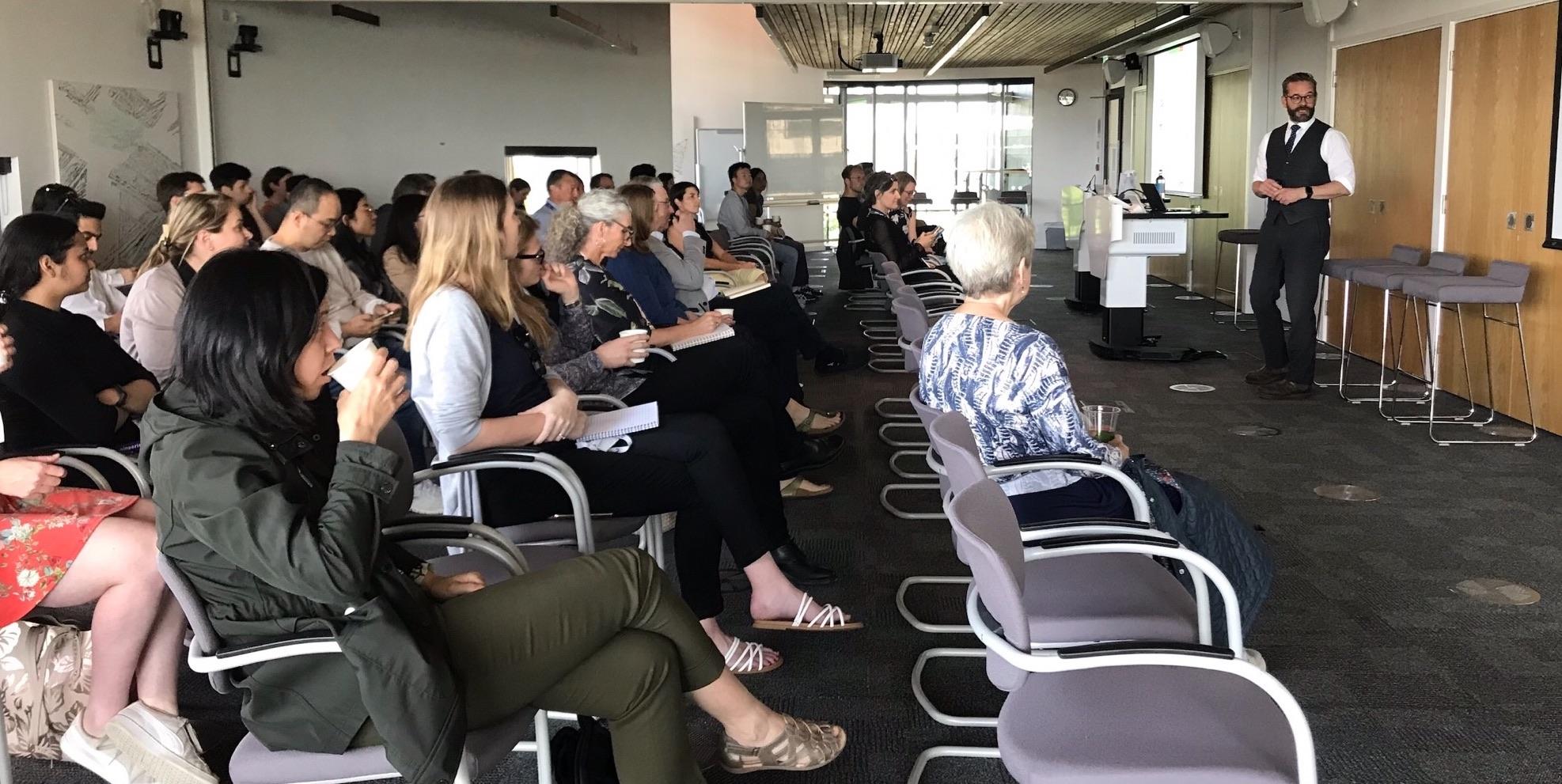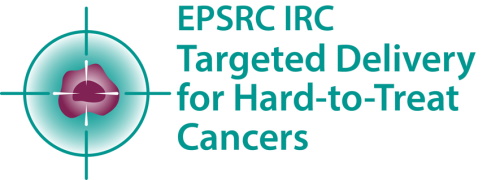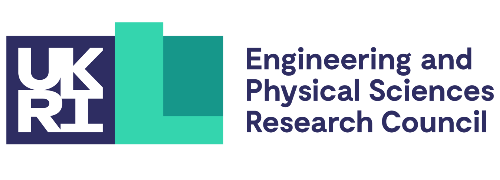
Submitted by L. Millard on Wed, 15/06/2022 - 09:55
A Town Hall meeting presented plans for the next five years of ground-breaking work at Cancer Research UK Cambridge Centre.
Having secured £22.5 million from Cancer Research UK, the Cancer Research UK Cambridge Centre (CRUK CC) called a series of Town Hall meetings held at different campuses across the University of Cambridge to invite researchers across disciplines to find out more about cancer research in Cambridge and how they can be involved.
The West Site meeting, held at the Maxwell Centre and attracting a full house, featured presentations by Professors Richard Gilbertson, Director CRUK CC, George Malliaras, Director IRC in Targeted Delivery for Hard-to-Treat Cancers, and Sarah Bohndiek, Department of Physics and CRUK Cambridge Institute. Professor Gilbertson reflected on the history of the CRUK CC, which he joined in 2015, and future plans: “Our strategy builds directly on progress made during the last five years, translating Cambridge innovations to improve and extend the lives of patients with cancer, wherever they live.”
Our strategy builds directly on progress made during the last five years, translating Cambridge innovations to improve and extend the lives of patients with cancer, wherever they live. Professor Richard Gilbertson, Director Cancer Research UK Cambridge Centre
Stating the urgency of transformational research across Cambridge, Professor Gilbertson emphasised the importance of taking a proactive approach to cancer, explaining that 90 million people across the world are diagnosed with cancer every year – with 10 million losing their lives. Currently, even in the UK where there is access to healthcare, many people are diagnosed with cancer at A&E departments and experience poor outcomes. Professor Gilbertson brought attention to Cambridge University campus expertise across physics, chemistry and engineering, integrated cancer medicine and precision cancer medicine that will be critical to increasing the ability to diagnose cancer as early as possible and understanding how best to use diagnostics to treat patients individually with what they need.
Outlining the strategic mission of the CRUK Cambridge Centre to end death and disease caused by cancer through research, treatment and education, Professor Gilbertson highlighted plans to make use of artificial intelligence and machine learning to redesign patient care pathways across the country, making widely available the results of world-class science to address current disparities in health outcomes resulting from where a patient lives and is treated. Building on the research talent in Cambridge, there are plans – aligned with the Government’s Life Sciences Industrial Strategy – for strategically enabled partnerships to create additional centres of research excellence, initially virtual institutes, to increase specialist foundational programmes that will become Institutes of Early Detection, Integrated Cancer Medicine and Precision Breast Cancer Medicine. This strategy supports one of the key aims of the NHS Long Term Plan to improve how cancer is diagnosed, with the ambition that by 2028 an extra 55,000 people each year will survive five years or more following their cancer diagnosis.
Professor George Malliaras, Director of the IRC in Targeted Delivery for Hard-to-Treat Cancers, introduced the work of the IRC by showing a short explainer animation that set out the low survival rate for patients diagnosed with three hard-to-treat cancers targeted by the programme – mesothelioma, pancreatic cancer and glioblastoma (a brain cancer). Despite improved survival rates for most cancers over the last two decades, nine out of 10 people diagnosed with one of these specific tumours in the lungs, brain and pancreas will succumb to the disease. Professor Malliaras explained the different drug delivery technologies being developed to overcome the barriers that make these cancers hard to treat, including: nano-scale molecular vehicles that deliver drugs exactly where they are needed and nowhere else; hydrogels that can be injected onto the cavity surface of the brain after a tumour has been removed to gradually release anti-cancer drugs to eliminate any residual tumour cells; and microscopic implantable devices which can deliver high concentrations of drugs directly to tumours that are difficult to operate on.
Professor Sarah Bohndiek introduced her lab’s work to advance the ability to see cancer at the earliest stages and how her research interest has led to the setting up of a new pan-University multidisciplinary strategic research initiative with a focus on precision health that she co-leads with Professor Andrew Flewitt from the Department of Engineering. Professor Bohndiek said: “We're looking at really driving the area of proactive medicine, moving towards looking at perturbations from our normal wellbeing as early markers of disease rather than looking at patients who already have the disease.”
Presenting the aim of her VISIONLab to use “multispectral imaging methods, combined with different approaches to computational analysis, to enable us to study tumour evolution”, Professor Bohndiek highlighted an endoscopy project that recently completed the first clinical trials in both the upper and lower GI tract and brings focus to the way blood vessels grow in tumours. Current early detection rates for the disease are poor and imaging is dependent on qualitative interpretation of the vascular patterns and mucosal structures by experts – which can be inconsistent and vary from one hospital to another. A recent project developed a ‘fibre baby scope’ that works with a standard white light endoscope to collect additional information from the tract region by capturing vascular spectrum changes relayed through coupling optics to a standard colour camera, and to a spectrometer that measures the full spectrum information.
The event concluded with a Q&A session that brought discussion to the possibilities of using in silico models of tumours for virtual trials, the strategic opportunities from partnering with industry, the increased interest in the early detection space, and the wider benefits for the NHS in early detection that could inspire new patient pathways, relieving over-burdened hospitals and offering patients a more evenly distributed healthcare system.
• Read more information about Cancer Research UK Cambridge Centre here.


